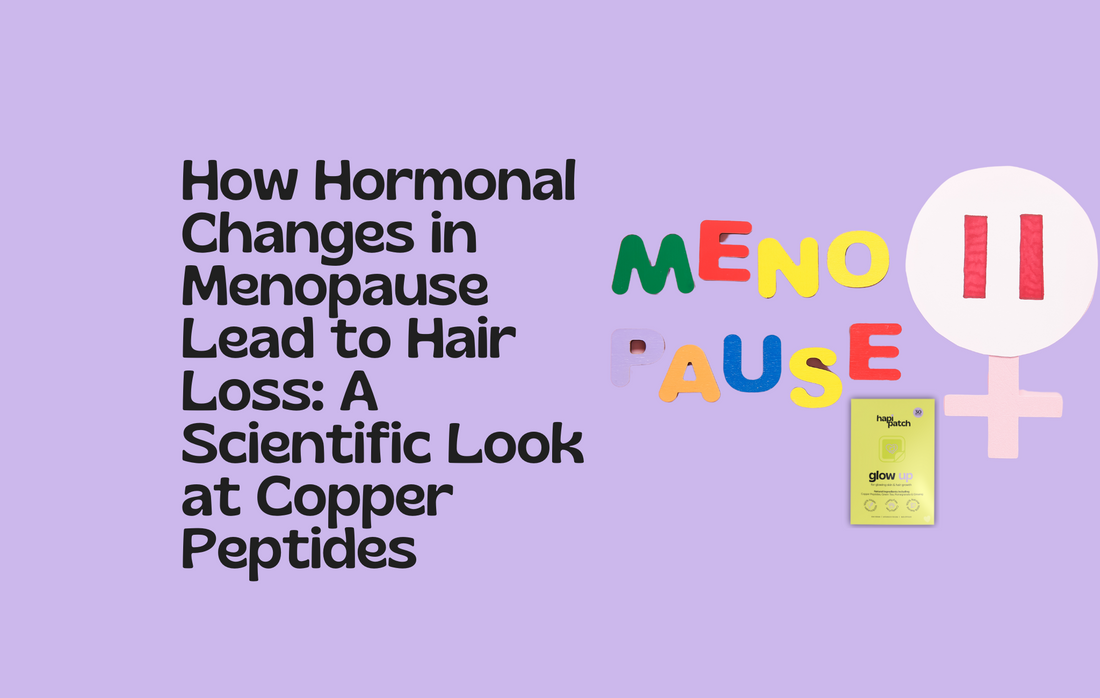As women approach and go through menopause, hormonal fluctuations significantly impact their health, including their hair. Thinning hair, hair shedding, and slower regrowth become common complaints. Understanding the science behind how hormonal changes affect hair health is key to finding effective treatments. In this blog, we’ll explore the role of hormones in menopause-induced hair loss and how copper peptides, specifically Glow Up Copper Peptide Patches from hapi patch, offer a science-backed solution.
The role of hormones in menopausal hair loss
Hormonal changes during menopause, particularly the reduction of oestrogen and progesterone, play a critical role in hair thinning and loss. Here's how:
- Decline in oestrogen: Oestrogen is known to prolong the anagen (growth) phase of hair follicles, meaning hair stays longer in the growing phase. When oestrogen levels drop during menopause, hair follicles spend less time in this phase, causing more shedding.
- Increase in androgen sensitivity: As oestrogen decreases, androgen hormones like testosterone and its derivative DHT (dihydrotestosterone) become more dominant. DHT shrinks hair follicles, making them produce thinner, weaker strands and eventually leading to hair loss.
- Hormonal imbalance: The overall hormonal imbalance during menopause disrupts the regular hair growth cycle, leading to slower regrowth and increased hair loss.
The science behind copper peptides and how they help menopausal hair loss
Copper peptides, especially GHK-Cu, have been scientifically studied for their regenerative properties, particularly in reversing the effects of hormonal hair loss. Here’s how they work:
- Blocking DHT: Copper peptides help inhibit the enzyme 5-alpha reductase, which converts testosterone into DHT. By reducing DHT levels in the scalp, copper peptides prevent hair follicles from shrinking and encourage healthier hair growth.
- Stimulating hair follicles: GHK-Cu extends the anagen (growth) phase, keeping hair follicles productive for longer. This is particularly important for menopausal women who experience shortened growth phases due to hormonal fluctuations.
- Boosting collagen production: Collagen is essential for maintaining the structure and elasticity of the scalp, which supports hair follicles. Copper peptides stimulate collagen production, ensuring a healthy scalp environment for hair to grow.
Why shampoos can’t reverse menopausal hair loss
Many women turn to hair loss shampoos in the hope of reversing menopausal hair loss, but these products are limited in their effectiveness. Here’s why:
- Surface-level treatment: Shampoos can only clean the scalp and hair shaft but cannot penetrate deep enough to affect hair follicles where growth occurs.
- Temporary improvements: While some shampoos may add volume or make hair look thicker temporarily, they do not address the underlying hormonal imbalance that causes hair loss.
- Lack of active ingredients: To stimulate hair regrowth, active ingredients need to reach the scalp’s deeper layers, which shampoos and topical solutions can’t achieve effectively.
Treating hair loss from within: Why transdermal patches work
The most effective way to treat hair loss during menopause is through a solution that reaches the bloodstream and targets hair follicles directly. Transdermal patches like Glow Up Copper Peptide Patches offer a superior solution because they work from the inside out.
- Deep absorption: Glow Up Copper Peptide Patches deliver GHK-Cu directly to the bloodstream, ensuring that the peptides reach the hair follicles where they are needed most.
- Sustained release: The patches provide a steady, controlled release of copper peptides over several hours, ensuring long-term stimulation of the hair follicles.
- Avoiding digestive breakdown: Unlike oral supplements that may lose potency during digestion, transdermal patches bypass the digestive system, providing direct, efficient delivery of active ingredients.
Why Glow Up Copper Peptide Patches are ideal for menopausal hair loss
Glow Up Copper Peptide Patches from hapi patch are a scientifically backed, reliable option for addressing hair loss during menopause. Here’s why they work:
- Targeted treatment: The patches allow you to apply copper peptides directly to the scalp, targeting areas where hair thinning is most prominent.
- 4-layered matrix design: The unique design ensures consistent delivery and absorption of GHK-Cu, providing long-lasting results for scalp health and hair regrowth.
- Non-hormonal solution: Copper peptides offer a natural, non-hormonal approach to treating menopausal hair loss without the side effects associated with hormone-based treatments.
Real results: Before and after success stories
Women experiencing menopausal hair loss have seen remarkable transformations after using Glow Up Copper Peptide Patches. Here are some of their stories:
- Anne, age 54: “After months of frustration with my thinning hair, I started using Glow Up patches. Within three months, I noticed a real difference. My hairline is filling in, and the texture of my hair is thicker.”
- Marianne, age 51: “I tried every shampoo and serum, but nothing worked for my menopausal hair loss. The Glow Up patches were my last hope, and they truly delivered. The before and after photos show just how much my hair has improved.”
FAQs About Copper Peptides for Menopausal Hair Loss
Can copper peptides help with hair loss during menopause?
Yes, copper peptides help block DHT and stimulate hair follicles, which is essential for promoting hair growth during menopause.
How long does it take to see results?
Results typically start appearing within 2-3 months of consistent use, with users reporting thicker, fuller hair and reduced shedding.
Are copper peptides safe for long-term use during menopause?
Yes, copper peptides are non-toxic and safe for long-term use, making them an ideal solution for ongoing hair thinning during menopause.
How do Glow Up Copper Peptide Patches compare to other treatments?
Glow Up patches deliver copper peptides directly to the scalp, ensuring deeper penetration and sustained stimulation of hair follicles compared to shampoos or serums.
Can copper peptides be used with other menopause treatments?
Yes, copper peptides can be safely combined with other menopause treatments, though they work best when delivered through transdermal patches for targeted results.

